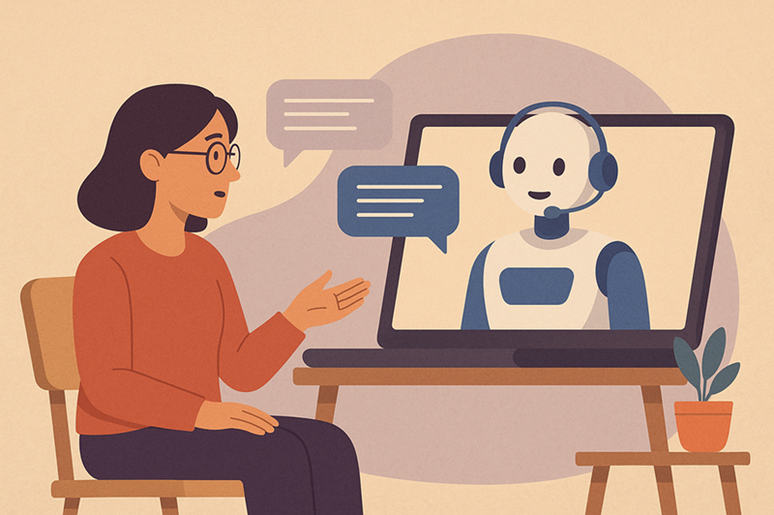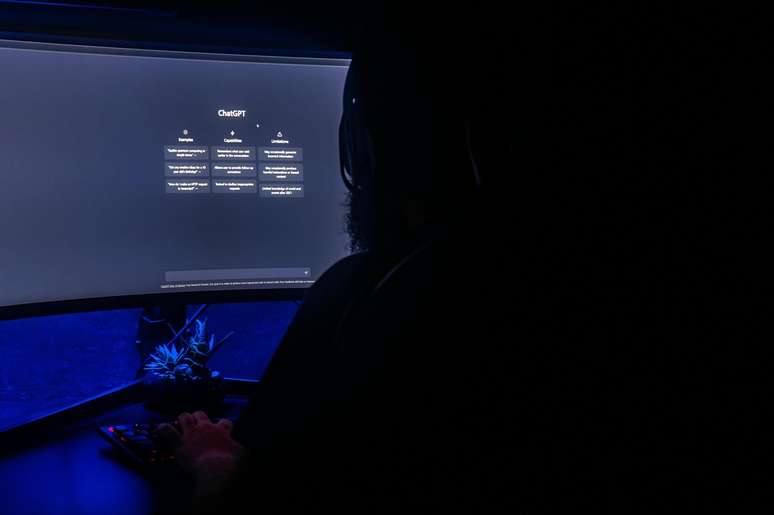Understand the benefits and limits of artificial intelligence therapy to choose how to use tools with awareness
Is artificial intelligence therapy effective? Can the consultation really help us chatbots? Artificial intelligence applications for mental health do they work? Questions like these are increasingly common.
In fact, the Artificial intelligence (AI) has transformed various areas of the company. And psychology is not outside this revolution.
On the one hand, technology offers new possibilities of access to information, speed in research and acceleration at work. But on the other, we face ethical and human limits that we still have to consider.
In the end, To what extent can IA be used as an effective therapeutic resource?
In this article, we will explore the benefits, challenges and limits of artificial intelligence therapy. Furthermore, as it can integrate, but never replace the essential human connection in the therapeutic process.
What is artificial intelligence therapy?
Artificial intelligence is already present in our daily life in various ways, from virtual assistants to algorithms that analyze emotions and behavioral models.
THE Artificial intelligence in psychology It appears in:
- Meditation applicationswhich use it to customize the recommendations of the practices based on mood, the chronology of the user or at the time of the day
- Online therapy platforms, which applies it on several fronts. For example, in the match between therapist and patient (analyzing profile and preferences). In the analysis of feelings during written or vocal sessions. Or also in automated recommendations for complementary content, such as articles, videos or exercises.
- Therapeutic chatbotsThat simulates an emotional support conversation or to guide reflections. Here he enters the ChatgptTHE Notebooklm (from Google), the best known.
In addition, applications are created with more and more resources to identify symptoms and problems and suggest solutions.
This ease allows you to access the tool at any time without having to mark the times or wait for the day of the appointments. But does it replace human contact in therapeutic listening?

Challenges and limits of AI therapy
Despite the benefits, the Artificial intelligence therapy presents significant challenges:
- Lack of human contact: Although artificial intelligence can simulate conversations and offer advice, it cannot replace the active listening and the emotional bond provided by a human therapist.
- Ethical and privacy problems: The collection of data and the privacy of personal information are valid concerns, especially when it comes to sensitive data shared on digital platforms.
- Limitations in critical cases: In more serious situations, such as suicidal ideation, outbreaks, episodes of cars -mutilation or deep trauma, the IA may not have sufficient sensitivity or discernment to recognize the urgency and refer to immediate human care.
- Risk of normalization of harmful behaviors: If the tool does not correctly interpret the emotional context of what is said, there is a danger of validating harmful behaviors as if they were acceptable or functional responses, which can strengthen the suffering models rather than help to overcome them.
- Risk of isolation and worsening of emotional issues: If you see the distance from human contact as an advantage, it probably transports not elaborated pain in bonds. In this context, the use of AI can intensify isolation and hinder the healing process.
- The ease of use of the AI can interrupt the creation of real ties: Artificial intelligence has been programmed to simulate kindness and listen to compassionate and say what you want to “listen to”, generating a spell. This is exactly what can move away from contact with people or even prevent you from meditating on your choices and decisions with a human being.
Read also: Mental health at work: how to recognize signs before reaching the limit
Advantages of artificial intelligence therapy
Artificial intelligence offers numerous advantages if used in the field of psychology, including:
- Immediate and continuous access: Artificial intelligence can provide immediate support, offer rapid advice and solutions to specific problems, such as reacting to a difficult conversation or how to express themselves more assertively.
- Accessibility: It can reach more people, in particular those who face financial difficulties or live in remote places with little access to mental health professionals.
- Practicality: Many people already have a cell phone and can easily access free applications or payment that offer immediate therapeutic support.
How to make good use of the AI?
It is not necessary to see artificial intelligence as a threat to psychotherapy: it can integrate the therapeutic process. But for this, it is important to make some reflections:
- Think first what is your goal: If you are looking for quick advice or punctual help, the IA can be useful. However, if you want to explore deeper questions, it is essential to look for a human professional.
- Use with moderation: Artificial intelligence can be useful to integrate psychotherapy, but should never replace the follow -up personal therapeutic.
- Evaluate the emotional impact: Ask if the use of artificial intelligence tools is helping your well -being or creating a greater distance from the human interactions necessary for the healing process.
Start questions, do research and look for new information on various subjects. It’s nice to have everything in the palm of your hand. Like any tool, it can be used for various purposes and objectives, both positive and negative.
It’s up to you to evaluate whether the use of the tool is to your advantage and is adding something to you or is further away from other people.
Read also: The Council of Artificial Halling for each sign
Artificial intelligence x emotional intelligence
Advanced as IA, there is something that can never replace: the Human emotional intelligence. The appearance, the tone of the voice, the corrective presence and the intuition of the therapist are irreplaceable.
Therapy involves more than information and techniques: it is based on the link, on the perception of what is not said and on the subjective experience of each person.
If, on the one hand, artificial intelligence can offer efficiency and analysis of data, on the other, only a human being can truly understand the pain and transformation of the other.
The pains of many are around relation. Perhaps this is the most central theme that is creating tentacles in various areas.
Even if it is trained to imitate a human being, the IA is not really present and He will never replace the link with someone else.
Artificial intelligence will not welcome your tears, will allow sensations to flow freely without judgment and take care of them together.
Therapy with IA as an ally, not replaced
Artificial intelligence can be an ally in psychotherapy, offering immediate support and helping to democratize access to mental health.
It is necessary to use technology consciously, without letting it replace the essence of the human therapeutic encounter.
The real transformation will take place in the space of a safe bond. And this can only be created between two or more people.
That is, only a safe relationship can cure the trauma that lived during development, such as separations, interruptions, waste and abandonment. For this, a person is necessary, not a car.
The post Artificial intelligence therapy: advantages, disadvantages and how to use appeared first in Personade.
Maria Cristina Gomes (mariacristinapsi@yahoo.com.br)
– He is a systemic psychologist. It works with trauma through the Somatic Experience® approach and addresses other interpersonal relationships, self -esteem and posture in the face of life. It serves online and in person in the city of Belo Horizonte.
Source: Terra
Ben Stock is a lifestyle journalist and author at Gossipify. He writes about topics such as health, wellness, travel, food and home decor. He provides practical advice and inspiration to improve well-being, keeps readers up to date with latest lifestyle news and trends, known for his engaging writing style, in-depth analysis and unique perspectives.









